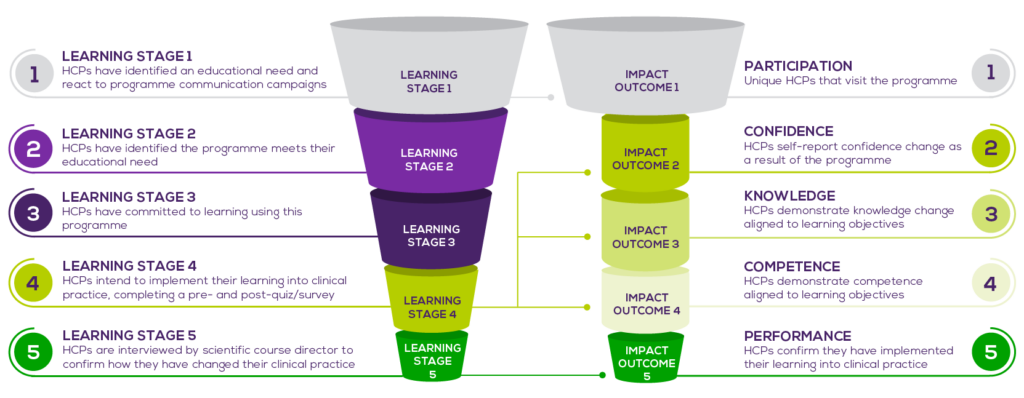Published 15 February 2024
The secret to effective impact measurement in digital medical education
Understanding the effectiveness of medical education remains a key challenge for pharma. Two-thirds find demonstrating behavioural impact and outcomes a major challenge for digital HCP engagement, leading many to persist with ‘vanity’ metrics that fail to signal real value for healthcare professionals and their patients.
It’s time to move towards more meaningful impact measurement. But what’s the best approach?
EPG Health has developed a novel, award-winning methodology: the Impact Outcomes Framework. The framework is applied to educational programmes delivered via our independent HCP platform Medthority (www.medthority.com).
It was pioneered in 2023 on a disease and treatment-focused Learning Zone, which has been recognised with a PMEA award for Excellence in Engagement through Digital Channels (see case study).
A FRAMEWORK TO TRACK LEARNING AND ASSESS IMPACT

EPG Health’s Impact Outcomes Framework arose from the need to evidence meaningful learning time and engagement with educational content to confidently demonstrate the impact on knowledge, behaviour and clinical practice (pharma’s #2 HCP engagement challenge).
It is adapted from the Moore’s Levels of Outcomes [1] to track HCPs’ learning behaviour through stages of learning in the digital space (see figure above).
“In 2009, Moore et al. created a framework to address the issue that continuing medical education (CME) provides ‘little more than documentation of attendance’. Fifteen years on, HCPs’ learning behaviours have changed, and they are now consuming small snippets of content over multiple visits using digital media. Healthcare education providers are closer to meeting these HCP needs, but now face a similar problem to Moore et al. in 2009 whereby they only track attendance or outcomes, but not both. Our adapted framework (Impact Outcomes) addresses this gap. We track individual HCPs’ learning journey over multiple sessions and devices to build a true understanding of engagement and learning time. Data are then linked to the individual HCP’s outcomes assessment. By combining engagement and outcomes, we can confidently measure impact and identify additional HCP needs.”
Matthew Hellyer – Head of Insight at EPG Health
Once sufficient active learning is demonstrated, outcomes aligned with pre-defined learning objectives can be assessed and correlated with confidence, knowledge, competence and performance. The approach also supports the ongoing identification of educational needs, adding context to findings and informing continuous programme evolution. Regular monitoring of pre-planned evaluation data allows us to formulate learning strategies, repeat successes and prepare for future opportunities.
To deliver measurable impact, digital educational programmes must first meet healthcare professionals’ evolving digital content consumption habits and preferences. Underpinned by EPG Health’s in-depth research on The Future of HCP Engagement Impact, our award-winning Medthority Learning Zone, is well aligned with these needs.
It features a bite-sized page structure and makes use of interview clips with key opinion leaders to put scientific information into clinical context, while infographics aid data visualisation.
– Consuming digital content mainly in their own time, HCPs favour easily consumable content types, such as short-form text (63% – high demand), short videos (57%) and infographics (39%) over their longer-form equivalents; only 27% have high demand for narratives over 1,000 words and 18% for long videos over 20 minutes.
– Highlights from two highly relevant congresses feature in the Learning Zone: 81% of HCPs have high demand for key disease topic takeaways from events they did not attend.
APPLYING THE APPROACH IN PRACTICE
After 6 months, the following engagement results (aligned to stages of learning) and Impact Outcomes were achieved with the award-winning Learning Zone:
- 5,023 total HCPs engaged, indicating a confirmed educational need
- 2 h 10 min average learning time among HCPs reaching Learning Stage 3, indicating a commitment to learning
- 73% were confident in their knowledge post-learning versus 36% beforehand
- 40% knowledge gain among HCPs completing pre- and post-learning assessments
- 92% said what they have learned will impact or change their clinical practice
Commenting on the programme, PMEA judges appreciated our channel integration and retargeting tactics. To reach target audiences and drive engagement, we leverage a diversity of channels catering to a range of preferences. Our multichannel communications span social media (paid and organic), paid search, personalised emails and AI-driven signposting on Medthority, plus automated retargeting to drive progress through the content and stages of learning.
“EPG Health has produced an impressive programme and provided valuable insights into the customer focus and learning journey steps. The team effectively highlighted the target audience in terms of channel and content preferences, and provided strong evidence surrounding audience segmentation. The judges appreciated the channel integration and the retargeting of tactics, along with the clever use of congress highlights to drive engagement.”
PMEA Awards judges’ comments

Via Medthority, EPG Health eases the discovery of clinically relevant, compliant and actionable learning, supporting the treatment decisions of healthcare professionals worldwide. Our industry-funded educational programmes help pharmaceutical customers to reach and engage the right audiences and measure meaningful learning impact.
Successful programme execution requires thoughtful implementation and a dynamic approach. To sustain advancement, a continuous cycle of measuring and assessing is needed, informing programme adaptation and improvement to meet new – and changing – educational needs in the real world. Through the creation and evolution of programmes tailored to HCPs’ needs and behaviours, we can demonstrate clinical impact aligned to our ultimate goal – to improve patient care.
Learn more about our Impact Outcomes Framework and see how it works in practice.
DOWNLOAD BROCHURE VIEW CASE STUDY
[1] Moore DE, et al. Achieving desired results and improved outcomes: integrating planning and assessment throughout learning activities. J Contin Educ Health Prof. 2009;29(1):1–15. DOI: 1002/chp.20001
About the author
STRATEGIC EDITORIAL ASSOCIATE DIRECTOR
Megan loves creating clear, concise and impactful healthcare communication that improves global patient wellbeing. Bringing experience in MedComms and publishing, she ensures content meets measurable learning objectives and applies ‘lean’ principles for efficient delivery.
News & Views
MORE ARTICLES